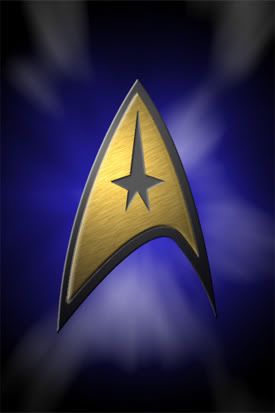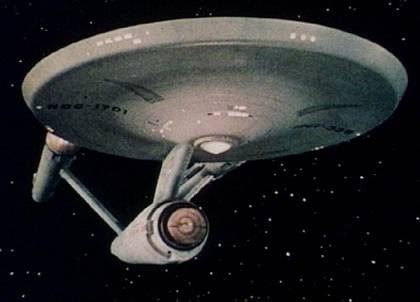
Between the Fan Collective DVD sets to which I have access, either through direct ownership or asking my parents very nicely, and the intelligent and hilarious opinionated reviews by sfdebris (even funnier in video format), I’ve been watching plenty of Star Trek lately. It’s not just good entertainment, it’s rich background material for anybody doing something creative in the science fiction genre. Ronald D. Moore used his experiences as a producer on The Next Generation to shape his re-launch of Battlestar Galactica, and when it came time for Joss Whedon to put Firefly down on paper, he likely looked at Star Trek almost as a reminder of what he didn’t want to do – no faster-than-light travel, no aliens, etc. But I’m getting ahead of myself.
What I’d like to do is look at the five Trek TV series on the whole, discuss how they came to be, what makes them stand out and where, with the benefit of hindsight, one might see room for improvement. It makes sense to begin at the beginning, with Gene Roddenberry’s original series.

It was the 1960s. A bitter Cold War was on between the United States and the Soviet Union, exemplified in, among other things, the space race. Voices of the generation were raised against what they saw as unjust or dictatorial practices, seeking equal rights for minorities and women as well as protesting the evils of war. Nuclear annihilation was a daily fear and television was coming into its own as a form of escapism for any household fortunate enough to own a color set.
This was the world into which Gene Roddenberry introduced Star Trek. Up until this point, popular science fiction had been limited to the campy likes of Buck Rogers and Flash Gordon, movie serials playing in the local cinema rather than the comfort of one’s own home. Most of the general population, then, expected Star Trek to be full of ray guns, rocket ships spouting fire from their backsides and villains dressed in bright robes with names like Ming the Merciless. The closest thing to what Star Trek brought to television was 1956’s Forbidden Planet.

In Star Trek we have the interstellar star ship the USS Enterprise, captained by one James T Kirk. Kirk and his crew are representatives of the United Federation of Planets, an organization of worlds promoting peace and exploration. In keeping with this somewhat Utopian society, the bridge crew includes an alien, a black woman, an Asian helmsman and, from the second season onward, a Russian navigator. The ship also has a Scotsman down in the engine room and a cranky country doctor in sickbay. This diverse crew will be doing more than flying really fast and shooting at bad guys: they negotiate treaties, investigate the unknown and travel through time.
The crew also slipped quite a few things passed NBC’s censors. Instead of being simple shallow entertainment, Star Trek’s writers, like the fictional crew, boldly forged into new territory. They tackled topics like race relations, sexism and war, using the Enterprise and her crew as an allegory for the United States of the day. While the scripts of the show were not immune to the frequent tampering by network executives and corporate sponsors, couching these controversial themes in science fiction trappings allowed a lot of the true innovation of the series to slip by unnoticed. Thus, at the same time communicators and transporters are introduced, we see hated enemies coming to an understanding and even grudging respect (“Balance of Terror”) and television’s first interracial kiss between fictional characters (“Plato’s Stepchildren”).
However – and this might be where I start getting flamed, folks – the show isn’t perfect. Roddenberry was adamant that his crew avoid interpersonal conflict. When Kirk and Spock battle in “Amok Time,” it’s done with Spock under the influence of the Vulcan pon farr, meaning he really isn’t himself and would never harm Kirk in other circumstances. While this reinforces the Utopian ideal of the Federation, it isn’t what I would consider realistic. Individuals with different upbringings are going to have differing opinions that may escalate into arguments and conflict, and this is just when those in questions are all humans. Throw aliens into the mix and the chances of conflict rise exponentially. Also, while the writing often goes in bold directions for the time, there is the occasional inexplicable weirdness of episodes like “Shore Leave,” where McCoy encounters Alice’s White Rabbit, “The Savage Curtain,” where the Enterprise crew battles evil alongside Abraham Lincoln, and “The Way to Eden,” in which the Enterprise is hijacked by hippies. Finally, the show was produced in the 1960s, so some of the effects can seem somewhat dated by today’s standards.
Despite the previous paragraph of nit-picking, science fiction wouldn’t be where it is today without the sizable contribution of Star Trek. In addition to it’s various innovations, it’s good television, more often than not written well with compelling characters and interesting stories. Unfortunately it only lasted three seasons before finally succumbing to the machinations of the network. It was followed by the well-done animated series in 1973, of which I’ve only seen a few episodes, and the first seven films of the Star Trek franchise, which may gain their own entries in upcoming IT CAME FROM NETFLIX! posts. In any event, what keeps it from being a mere footnote in the ever-evolving field of science fiction is the quality of the storytelling. Yes, the effects might not have aged well and sometimes the 60s-era writers get a little baked and produce something odd, but overall Star Trek set the standard for innovative, socially-aware and damn good science fiction delivered right to your TV set.


Minor quibble…
If that’s the case, how would you classify, e.g., the Thirteenth Amendment in 1865? The women’s suffrage movements of the 19th century, leading into the ILO’s state goal to “promote opportunities for women and men to obtain decent and productive work, in conditions of freedom, equity, security and human dignity” as part of the pre-WWII League Nations? The Universal Declaration of Human Rights in ’48?
For that matter, the whole Civil War, or the American Revolution, itself an outgrowth of the Enlightenment, that last beginning in the 1600s?
Perhaps better to say that, like most generations, at the time those taking part considered themselves forerunners of something new… while actually being the outgrowth of a process of progress older than their country, much less their generation.
In retrospect, you have a definite point and I’ve edited the post to reflect that.
It’s easy to fall into the trap of considering one’s generation, or the one that gave birth to said generation, to be innovators.
*nod* It’s fairly universal to believe that surely yours is the first generation to think as it does, do what it does, etc.
And yet we have Babylonian tablets complaining that children no longer respect their elders, and will surely destroy civilization forever, and Roman students writing letters home to their parents indicating the need for more spending money and less oversight… There’s progress, but human nature seems to follow a certain cyclical bent.